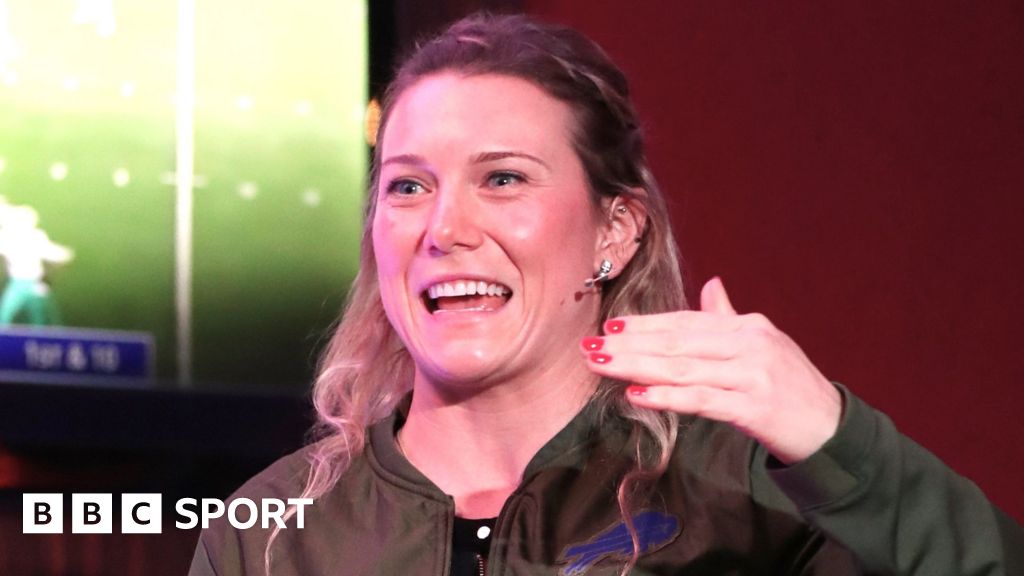More than a decade after seeing that social media ad, Schecter is one of the UK’s biggest American football personalities.
But don’t let her accent fool you. Her love of American football blossomed in the UK.
“When I was in the States, I watched maybe two Super Bowls,” she says. “I hate to say it now, but I thought the sport was so boring. I didn’t understand it at all.
“So now, to think I was able to work my way up and go to the NFL, it’s kind of one of those pinch-me things, that you don’t believe is real.”
Soon after the trial in Manchester, Schecter became one of the founding members of the GB women’s tackle football team. She also started playing flag football – the non-contact version of the game, which will make its Olympic debut at Los Angeles 2028 – and with the Staffordshire Surge, a men’s tackle team.
She took an interest in coaching and in 2016 did the first of three internships at American universities. Then in 2017, she did the first of two internships with the Buffalo Bills, becoming Britain’s first female coach in the NFL.
Having not grown up with the game, Schecter says she “came into this whole experience knowing I was behind the eight ball – I had to fast-track my learning”.
She created her own glossary to help herself with the game’s terminology. She printed pictures of the Bills’ coaching staff so she’d know who was who. She joined as many meetings as possible and continually asked questions.
“It was a baptism of fire,” she says. “It was definitely a huge learning curve. But being curious has been really helpful for me. I was doing whatever I could to build my experience and absorb as much information as possible.
“I wanted to learn and was so passionate. I had consistent, positive energy – every single day, no matter what the result was at the weekend. It may seem like nothing, but it’s actually really important.
“Once you understand the value you bring to a team, it gives you that boost of confidence of ‘I know why I’m here, I know what I can do’.”
The NFL is a male-dominated environment but Schecter tried to ignore the fact she was one of the few women clocking in at the Bills’ training facility each day.
“If you go into that experience thinking ‘oh my gosh, I’m the only woman here’, you already have the wrong mindset, your focus is going to be on the wrong thing,” she says. “I was there to be the best educator and coach I can be, regardless of my background.
“Some of the guys were saying ‘hey, what can’t I say around you?’ But I said ‘in order to get the best version of you, I need you to be your authentic self, to speak freely’. If it’s not something you’d say in front of your mother or grandmother, perhaps it’s something you shouldn’t be saying in a professional environment anyway.
“But being a woman was also a super power in some ways. Having those inter-personal skills, a lot of my athletes felt more comfortable speaking to me because they grew up in single-mother homes, so to have a female around wasn’t a bad thing.
“They just weren’t used to it in a coaching capacity.”
Schecter remembers the moment she truly felt that she belonged.
The Bills’ offensive unit had a meeting each morning and everyone would sit in the same seat. When a new player came in mid-season and sat in Schecter’s seat he was told ‘you’ve got to get up, this is her seat’.
“That meant so much,” she says. “It was only a little thing but the feeling of belonging was huge. I was really a part of that team. They really saw me as one of them.”
Schecter has enjoyed a similar feeling in her broadcasting career, which also began by chance.


